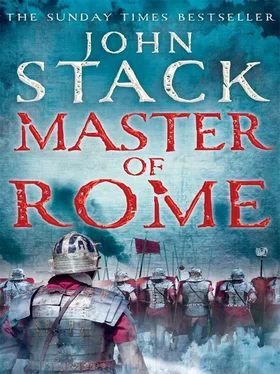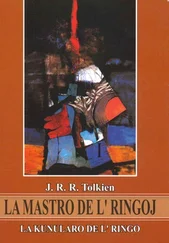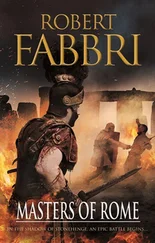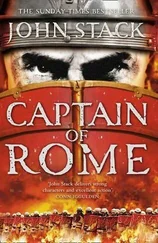John Stack - Master of Rome
Здесь есть возможность читать онлайн «John Stack - Master of Rome» — ознакомительный отрывок электронной книги совершенно бесплатно, а после прочтения отрывка купить полную версию. В некоторых случаях можно слушать аудио, скачать через торрент в формате fb2 и присутствует краткое содержание. Жанр: Исторические приключения, на английском языке. Описание произведения, (предисловие) а так же отзывы посетителей доступны на портале библиотеки ЛибКат.
- Название:Master of Rome
- Автор:
- Жанр:
- Год:неизвестен
- ISBN:нет данных
- Рейтинг книги:4 / 5. Голосов: 1
-
Избранное:Добавить в избранное
- Отзывы:
-
Ваша оценка:
- 80
- 1
- 2
- 3
- 4
- 5
Master of Rome: краткое содержание, описание и аннотация
Предлагаем к чтению аннотацию, описание, краткое содержание или предисловие (зависит от того, что написал сам автор книги «Master of Rome»). Если вы не нашли необходимую информацию о книге — напишите в комментариях, мы постараемся отыскать её.
Master of Rome — читать онлайн ознакомительный отрывок
Ниже представлен текст книги, разбитый по страницам. Система сохранения места последней прочитанной страницы, позволяет с удобством читать онлайн бесплатно книгу «Master of Rome», без необходимости каждый раз заново искать на чём Вы остановились. Поставьте закладку, и сможете в любой момент перейти на страницу, на которой закончили чтение.
Интервал:
Закладка:
The Carthaginian line hardened as the initial strength of the Roman charge was absorbed and Atticus bunched his weight behind his shield as he felt the first counter-surge from deep within the enemy ranks. The pendulum had swung back in the Carthaginians’ favour, their numbers and command of a wider front allowing them to push their ranks forward from the back, giving their front line no choice but to step deeper into the Roman assault in an attempt to push the attack line back in turn.
Atticus heard a roar of command from his side, and out of the corner of his eye he noticed that Septimus stood beside him, the centurion’s voice carrying clearly above the clash of steel and the cries of death and fury. Behind he could hear the deeper tone of Drusus’s voice, urging the men forward against the crush, harnessing the stamina of soldiers bred on the march, their strength halting the Carthaginian surge.
The battle line became compressed, forcing Atticus to shorten his sword thrusts, each riposte and recovery of his blade testing the strength of his sword arm as he drove his weapon back into the fray, a defender not inches from his chest, the man’s eyes locked on Atticus’s, his roar of defiance lost in the noise of battle, the spittle from the Carthaginian’s war cry mingling with the sweat on Atticus’s face as he fought on and on.
The front line was a shambles, a place of butchery, where men’s lives were sacrificed for inches of deck space and the slain fell only where the crush allowed. The deck underfoot was coated with the blood of both sides, the battle line becoming static as the pressure equalized on all sides. The pendulum of advantage had swung back from the Carthaginians, but only to the nadir of its arc. It dangled over the capricious battle line, waiting to see which side would break first.
Hamilcar stood in the midst of his men, calling to them to push ever onwards, to sweep the enemy from the deck of the Alissar, to fight as if the Romans were threatening the very walls of sacred Carthage. His senses picked up the slight tilt in the deck beneath him, his galley already dying, its final demise stayed only by the Roman ram deep within its bowels, keeping the Alissar afloat. It was a realization that put further steel in his heart and he heaved forward with his men, robbing those fighting at the front of the room to wield their swords, sacrificing them in an effort to reverse the Roman attack.
The pressure increased and again Hamilcar called for his line to advance, his breath catching in the crush of men, the grunts and gasps of the heaving mass overcoming the sound of clashing steel in the battle line. Hamilcar looked to the row of Roman helmets not six feet away, his eyes drawn to the tallest man in the centre. He was the centurion who had stood beside the Greek before the battle of Cape Hermaeum.
The sight caused Hamilcar to redouble his efforts and the men around him took heart from the determination of their commander, their war cries reaching a ferocity that emboldened the Carthaginian ranks. The line seemed to tremble, like a bow drawn to its furthest limits, a shuddering tension that threatened release, and Hamilcar felt his blood lust intensify as he suddenly took a full step forward, the pressure abating in front of him, his men responding with a savage cheer as the Carthaginian line advanced.
Septimus stared coldly over the leading edge of his shield at the Carthaginian soldier inches from his face, the man screaming a curse in guttural Punic, his face twisted in exertion as he tried to push the Roman line back. Septimus struck out with his sword, blindly judging the angle of attack, and the Carthaginian’s scream turned to one of agony, blood erupting from his mouth as Septimus twisted his blade to savage the flesh and free his sword. The man slumped, unable to fall freely, and Septimus turned his shoulder slightly to clear his sword, ready for the next attack.
The fight seemed unrelenting but, while his legs ached from the effort of holding back the flood of Carthaginian warriors, his sword arm felt tireless, the close-quarter fighting a natural environment for the gladius in his hand, the simple thrust and withdrawal of the blade an almost reflex movement.
His men around him fought without check or mercy, the bodies of the enemy slain laid thick before them, and Septimus judged the Carthaginians were losing two or even three men to every Roman lost. Again the pressure increased and Septimus tensed the muscles on his lower legs, pushing the hobnails on his sandals into the timber deck to give him purchase under the surface of viscous blood and viscera. He was staggered by the intensity of the Carthaginian defence, the sheer blind fury of an enemy that would use the leading edge of their ranks as a ram to break through the Roman line.
A Carthaginian soldier heaved over his fallen comrade and Septimus struck out again, stabbing low, the crush turning his blade off true. He sliced through the edge of his opponent’s inner thigh, a brutal injury that was a death sentence in a fight where rotation out of the battle line was impossible, and Septimus stared into the terrified, pain-twisted face of the Carthaginian before striking out again with impunity, his opponent unable to defend himself in the agony of his injury.
Septimus withdrew his sword, ready to strike again, when he was arrested by a blood-chilling sensation down the left side of his body. An incredible surge swept through his shield arm and down his leg, a force that surmounted all that had come before, and he felt his body give way under the strain, his mind registering the cheer of the Carthaginians as the entire Roman line was driven back a pace.
A sudden panic overwhelmed him and he shouted to his men to hold fast, the call taken up by Atticus by his side and Drusus to his rear. It was a forlorn command, and within seconds another foot of deck space was lost. Septimus lashed out with his sword, the blade finding exposed flesh, but the pressure never slackened. Cries of alarm to his rear rang out and he looked over his shoulder through the crush of legionaries that filled the six-foot deep sliver of Roman-held deck. The side rail was giving way and Septimus stared in horror as three men disappeared over the side, their fall to the sea lost in the rising chaos, their deaths sealed by their heavy armour.
He spun around, his conscious thoughts receding under a terrible fury, and the knuckles of his bloodstained sword hand turned white under the strength of his grip. If his men were to die, they would die fighting the enemy, not like vermin cast overboard. He summoned up the full measure of his will, knowing he had to reverse the momentum of the enemy’s charge.
‘Men of the Ninth!’ he yelled, and the legionaries around him looked to their centurion. ‘Prepare to redeploy!’
They roared in reply, a ferocious affirmation to a commander they had followed into the maw of death.
‘Wedge formation!’ Septimus roared, and he immediately twisted his body to the side and shoved forward with all his strength, his shield angled to drive between two Carthaginians to his front in a desperate attempt to negate the enormous strength of the Carthaginian line, to force a breach and give his men a fighting chance.
Atticus followed Septimus without hesitation, pushing against the Carthaginian to the centurion’s left, his body angled to guard Septimus’s flank. The strength of the Carthaginian line was concentrated in the advance forward while sideways their cohesion was weaker, and the sudden lunge of the wedge formation drove the leading edge deep into the enemy ranks. The legionaries fought with brute aggression, punching their swords into the Carthaginian ranks, and they fed into the back end of the wedge, completely changing the aspect of their attack within seconds.
Читать дальшеИнтервал:
Закладка:
Похожие книги на «Master of Rome»
Представляем Вашему вниманию похожие книги на «Master of Rome» списком для выбора. Мы отобрали схожую по названию и смыслу литературу в надежде предоставить читателям больше вариантов отыскать новые, интересные, ещё непрочитанные произведения.
Обсуждение, отзывы о книге «Master of Rome» и просто собственные мнения читателей. Оставьте ваши комментарии, напишите, что Вы думаете о произведении, его смысле или главных героях. Укажите что конкретно понравилось, а что нет, и почему Вы так считаете.










